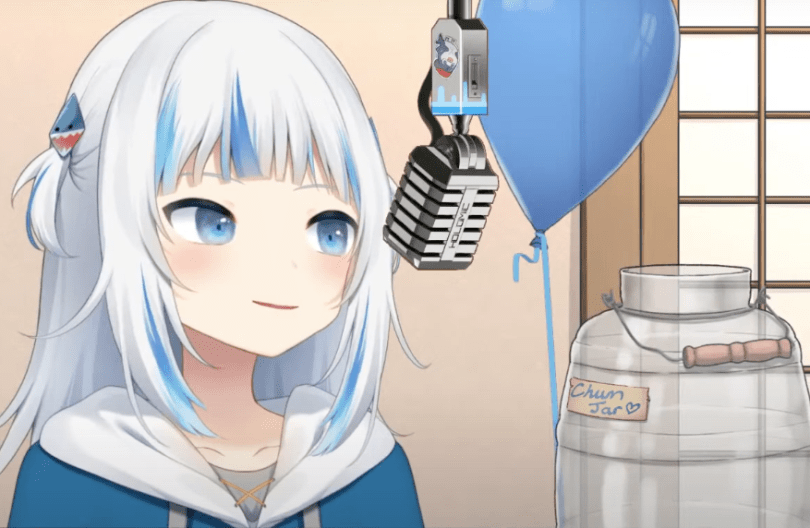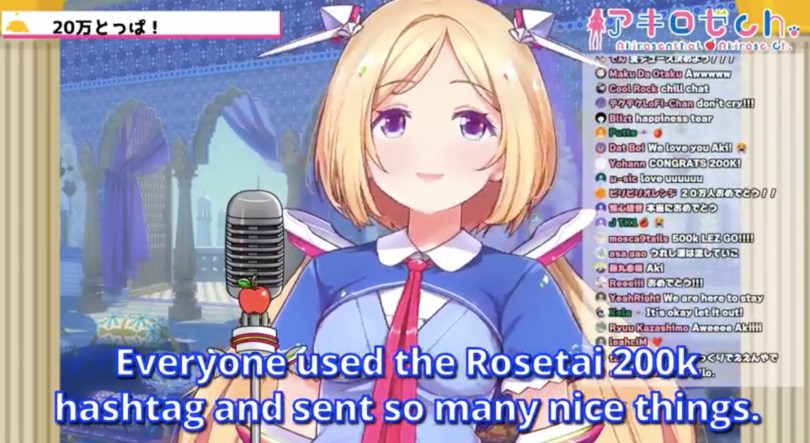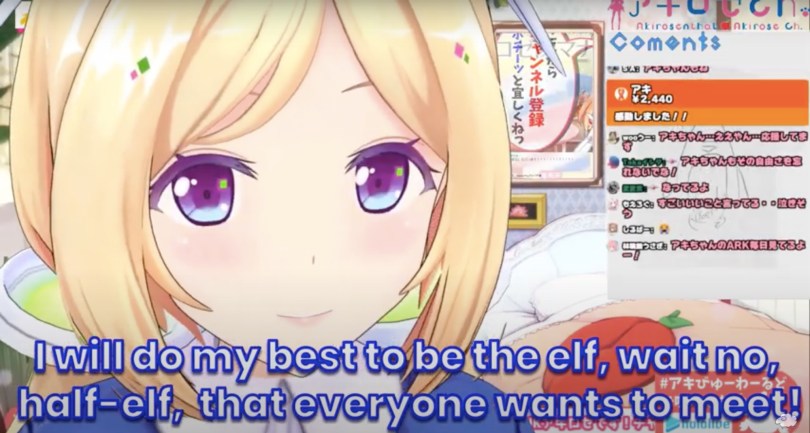Content Warning: discussion of online harassment
At the start of the COVID-19 pandemic, the anime industry found itself in crisis, alongside much of the rest of the world. Shutdowns were causing series to be delayed left and right, including highly anticipated titles like the second season of Re:Zero: Starting Life in Another World. Starved of both entertainment and socialization, many fans turned to a new format for both: video game streamers who use anime-style three-dimensional rigs to stream instead of their faces. These virtual YouTubers, also known as VTubers, proved to be an essential source of consolation and comfort to many isolated by quarantine, and swiftly grew into a phenomenon.
However, while many people can maintain a healthy relationship with them as entertainment personalities, others developed an unhealthy level of parasocial attachment, particularly to the female creators. These parasocial fans have caused incident after incident, making the space unsafe to VTubers and the audience alike, and are even suspected to have caused some of them to “graduate,” or retire from streaming. The most infamous of those incidents is the case of Kiryu Coco, a once-popular streamer who graduated shortly after offhandedly treating Taiwan as an independent country.

The incident began on September 27th, 2020, when Coco, streaming along with fellow VTuber Akai Haato, named Taiwan as a country that audience members were viewing from, and displayed the country’s independent flag. The harassment from Chinese nationalists was swift and severe, and the two were suspended from streaming by their management agency Hololive.
Well-meaning fans will often go after other VTubers, feeling they are defending their favorite girl, but the results are typically counterproductive. In the months after the incident, Coco’s fans went after members of HoloMyth, the company’s newly-founded English language branch. They figured since Coco was fluent in English, it was only natural that HoloMyth streamers would collaborate with her, and pressed them on why they weren’t. Without any answers they found satisfactory they began to draw their own conclusions and assumptions, which evolved into false rumors that HoloMyth’s managers were telling them not to associate with Coco. Others accused them of snobbery. Eventually, HoloMyth’s Kiara Takanashi cleared up the rumors, stating in a stream on April 5th, “I think, no one from the HoloEn girls is against collaborating with her.” Between the gossip and the chronic invasions from Chinese nationalists, the situation remained tense for quite a while even after being orally clarified.

Only two months later, Coco announced her graduation as of the first of July. In the announcement stream, she specifically instructed her viewers not to discuss her retirement in the chats of other Hololive members, almost certainly due to the poor boundaries they had displayed toward the members of Holomyth.
Coco was not the only VTuber with overzealous fans who misbehaved in other streamers’ chats. During a game of Among Us between several Hololive streamers, fans of English-language idol Gawr Gura started harassing another idol on the stream, Airani lofifteen, who is bilingual in English and Japanese. They objected to Iofi not interpreting for Gura during the game, claiming the language barrier was making her lose. Iofi responded that she was invited to play, not interpret. In retaliation, Gura’s supporters verbally assaulted her.

These fans, so wrapped up in seeing themselves as Gura’s white knights, neglected to treat Iofi with even a modicum of the respect she deserves. This type of fan acts almost like a helicopter parent, obsessed with “helping” their favorite and hovering around them with no qualms about hurting the people they work with, even when it is completely unwarranted.
Though Gura’s fans may have thought they were doing her a favor by “defending” her, their harassment only hurt everyone around her. lofi tweeted after the stream, “So sorry for being useless, I’ll try to ask other senpai to look for someone else for translating the whole conversation, not me,” despite not being obligated to translate for Gura in the first place. When asked, Gura expressed no ill will towards any of the participants after the stream and seemed bewildered by the suggestion that her experience had been negative. Her fans’ parasocial entitlement and overprotectiveness caused a rift between how they perceived the situation and its reality. Like a helicopter parent, parasocial fans tend to infantilize their favorite personalities by assuming they know what the personality needs best, as opposed to the personality themself.

Furthermore, when Gura’s fans say things like, “GURA needs to win, why is GURA losing,” it may also make the other members in the stream feel less deserving of respect. Some idols may even start thinking, “Why does she have more subscribers than me?” or “Why does she get fewer antis (trolls) in her chat than me?” In the days following her graduation announcement, Coco mentioned that she felt she was in a spiral of comparing herself to others too much. In a clip translated by Yaku Translations, Coco said that she found herself unable to stop comparing herself to others in Hololive and that it was making her miserable over and over. The toxic comments amplify the doubts that come along with working in a profession where talent is constantly scrutinized and ranked.
Because of that constant monitoring of talents, fans hold VTubers to a behavior standard that is very fragile. Their love is conditional on the subject maintaining an illusion of accessibility at all times, and they can become enraged when the slightest hint of human behavior shatters that illusion.
The Hololive member Uruha Rushia was best known for girlfriend roleplay streams, in which she would talk to the audience as if she were their girlfriend talking to them one-on-one. Fans would support her using superchats, a kind of donation done through YouTube during streams that’s akin to tipping a performer in real life. When she received a Discord message from the male singer Mafumafu during one such stream, fans began to speculate about their relationship. Some became enraged, claiming they felt “betrayed” at even the idea that she might have a partner in real life, and harassed her with vulgar messages so severely that Rushia took a leave of absence to recover.

Many said their sense of betrayal came from the fact they sent Rushia superchats during her girlfriend roleplay streams. While superchats are a valid way to support an entertainer, parasocial fans may donate huge sums in an attempt to stand out and buy their subject’s attention and, in their mind, love. Rushia’s fans allowed themselves to start to believe in the illusion created by the girlfriend roleplay streams, developing a sense of ownership and entitlement. When the message appeared, the illusion was shattered, or they felt like she was cheating on them.
Unfortunately, Rushia would not recover her position even after her leave of absence. In an attempt to address the speculation and to salvage her ability to perform what had become her niche, Rushia disclosed personal, confidential information to a gossip YouTuber known as Korekore, requesting they keep the details private. Despite that, Korekore revealed what she had told them, and Cover terminated Rushia for breach of conduct. In her desperation to escape the aggression and anger brought on by her former fans’ sense of parasocial attachment, Rushia made an ill-advised choice that cost her career.
Despite the way it ended, many fans tried their best to help by voicing support and understanding for Rushia’s situation in the form of messages, art, and memes when the message first leaked. Despite the prevalence of parasocial relationships, most VTuber fans are still able to maintain healthy boundaries and act as a positive presence in their idols’ lives. In another case, the first-generation Hololive Vtuber Aki Rosenthal admitted that she felt discouraged over having the lowest subscriber count of her generation after two and a half years of streaming. When one of her fans, known as Einnashu, translated her statement, overseas viewers were touched by her devotion in the face of her insecurity.

They rallied together to put together a subscription drive for Aki, using Twitter hashtags and sharing her story. Within a few days, she went from under 200K to 215K subscribers, for which she expressed her gratitude. Thanks to the outpouring of support, Aki became more confident, regularly joining in collaboration streams she once avoided and attempting to chat with her overseas viewers in English. Sure, seeing the number of subscribers increase was nice, but it was viewers going out of their way to help that really meant the world to her. The simple act of kindness inspired her to make an entire creative comeback.

Aki’s story shows what can happen when fans use their enthusiasm for idols to bolster them instead of tearing them and others down and should be the norm instead of the exception. , However, parasociality has become normalized, and fans must make an active effort to shift the culture toward healthier attachments. Some streamers have started actively setting boundaries, such as the Nijisanji streamer Fulgur Ovid, who made it the first rule in his chat that his sole purpose is entertainment, not to form a relationship with his fans.

Fan communities need strong moderation that does not allow for misogynistic statements or behavior that develops into toxicity. Talk to your friends if you feel like they’re developing a sense of entitlement. When clippers edit videos to take jokes and statements out of context to make a VTuber come across poorly, speak up and put things back into context, and discourage others from giving those channels views. Companies need to build stronger non-punitive practices for what streamers can do in situations like the ones Coco and Rushia found them in, offering them support beyond just damage control. By destroying the parasocial culture, we can guarantee a less toxic world for VTubers so that fewer people have to endure what Coco did.






Comments are open! Please read our comments policy before joining the conversation and contact us if you have any problems.